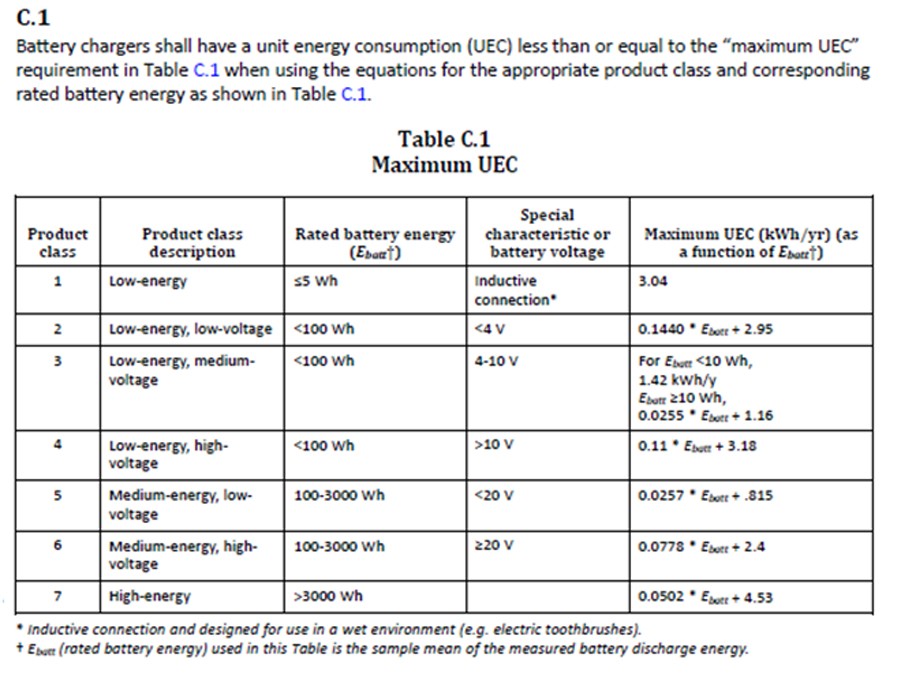On March 31, 2018, the Natural Resources Energy Efficiency Council of Canada (NRCan) issued an energy efficiency regulation for battery chargers (enforced on June 13, 2019). Although the energy efficiency requirements of the regulation are consistent with the BCS requirements of the US Energy Department (DOE), NRCan has its own registration system and requires that products shall be attached EEV energy efficiency label, so the battery charger still needs to get NRCan certificate when entering the Canadian market except for British Columbia’s. British Columbia can directly accept: BCS produced after June 13, 2018 and completed DOE registrations, in compliance with DOE requirements, can enter British Columbia.
Products entering Canada must meet the energy efficiency certification requirements of NRCan since June 13, 2019, the specific details of consumer battery charger are as follows:
British Columbia-Consumer Battery Chargers:
Definition of consumer battery charger:
Refers to a battery charging system that meets the following elements and also includes a battery charging system built into other products:
Input power is less than 2KW and distributed everywhere, mainly for personal use.
However, the following products are excluded:
a. Electromagnetic induction cell charging system(wireless charging system) with a power of less than 1W in maintenance mode and less than 1W in non-battery mode and an average power of less than or equal to 1W during charging and maintenance mode.
b. The power of the maintenance mode does not exceed 0.8 + 0.0021 * EbW and is incorporated into the battery charging system in the UPS.
c. Battery analyser or battery charger using in medical devices or export signs.
d. Battery charging systems built into other energy efficiency products.
e. Battery charging systems that only rely on solar or wind energy .
NRCan- Battery charger energy efficiency requirements:
Definition of battery chargers ( BCS): Refers to a device that charges a battery for a wheelchair, golf cart, low-speed vehicle, or other end products.
Battery chargers that are not in range are: a device for charging a battery of a vehicle other than the above vehicle, a device for charging a battery of the medical device, a wireless battery charger, and a backup battery charger.
The official text of the regulations is as follows:
Battery charger means a device that charges the battery of a wheelchair, golf cart, low-speed vehicle or any other end-use product. It does not include any of the following:
a. a device that charges the battery of a vehicle other than a wheelchair, golf cart or low-speed vehicle;
b. a device that charges the battery of a medical device;
c. a wireless battery charger; or
d. a backup battery charger.
Test method:
a. CSA C381.2-17
b. 10 C.F.R. Appendix Y (Reference to the US Energy Department (DOE) test method)
Energy efficiency limits refer to Table C.1 in CSA C381.2-17, the official text is as follows:

BACl Service:
BACL is the 16th OSHA-accredited NRTL organization in the United States. It is also the TCB issuing body of the US FCC, the CB issuing body of the US EPA ENERGY STAR, the highest level of the CE NB notified body, and one of the Canadian ICFCB issuing bodies. BACL can provide you with battery chargers ( BCS) American DOE, California CEC, Canada NRcan, EU CE ERP and other energy efficiency testing and certification services to ensure your products enter the international market smoothly! Welcome to contact us!

 CN/中国
CN/中国  US/USA
US/USA  KR/Korea
KR/Korea  DE/Germany
DE/Germany  ES/Spain
ES/Spain VN/Việtnam
VN/Việtnam